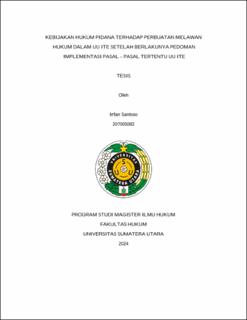Kebijakan Hukum Pidana terhadap Perbuatan Melawan Hukum dalam UU ITE Setelah Berlakunya Pedoman Implementasi Pasal – Pasal Tertentu UU ITE
Criminal Justice Policy Regarding Illegal Acts Under the ITE Law After the Enacment of the Implementation Guidelines for The Current Provisions of the IIE Law

Date
2024Author
Santoso, Irfan
Advisor(s)
Syahrin, Alvi
Mulyadi, Mahmud
Agusmidah
Metadata
Show full item recordAbstract
The advancement of technology and information significantly influences interpersonal interactions. While the growth of the digital realm has positively impacted society, it has also led to the misuse of technology by some individuals and groups for criminal activities aimed at gaining illicit profits. To address these issues in Indonesia, the government enacted Law No. 11 of 2008, which was subsequently amended to Law No. 19 of 2019. This legislation includes several articles that have been criticized for their potential for multiple interpretations, which can lead to inconsistent legal outcomes. As a result, a joint regulation (SKB) was issued to provide implementation guidelines for certain articles of the ITE Law. The articles in question are Article 27 paragraph (1) concerning morality, Article 27 paragraph (3) related to insults and defamation, Article 28 paragraph (2) addressing hate speech and SARA (ethnic, racial, and religious issues), and Article 29 regarding threats through electronic media. This research seeks to address three main issues: first, the criminal law policy for preventing technology-related crimes; second, the criminal law policy concerning unlawful acts under the ITE Law following the implementation guidelines; and third, the law enforcement efforts by authorities, particularly in the North Sumatra Police region, in light of these guidelines. This study employs a normative research methodology with an analytical- descriptive approach, examining relevant laws and regulations. The findings indicate that before the ITE Law was enacted, various pieces of legislation addressed information technology crimes but with differing criminalization approaches. The ITE Law aimed to address these legislative gaps, yet it has generated debate due to some articles being open to multiple interpretations. Consequently, the SKB on the implementation of certain articles of the ITE Law was introduced to guide law enforcement officials in exercising their duties. The SKB aims to help officials manage and resolve technology-related criminal cases, prioritizing restorative justice and resorting to punitive measures only if reconciliation fails.
Keywords: Criminal Law Policy, Unlawful Acts, ITE Law, Implementation Guidelines for Specific Articles
Collections
- Master Theses [1926]
